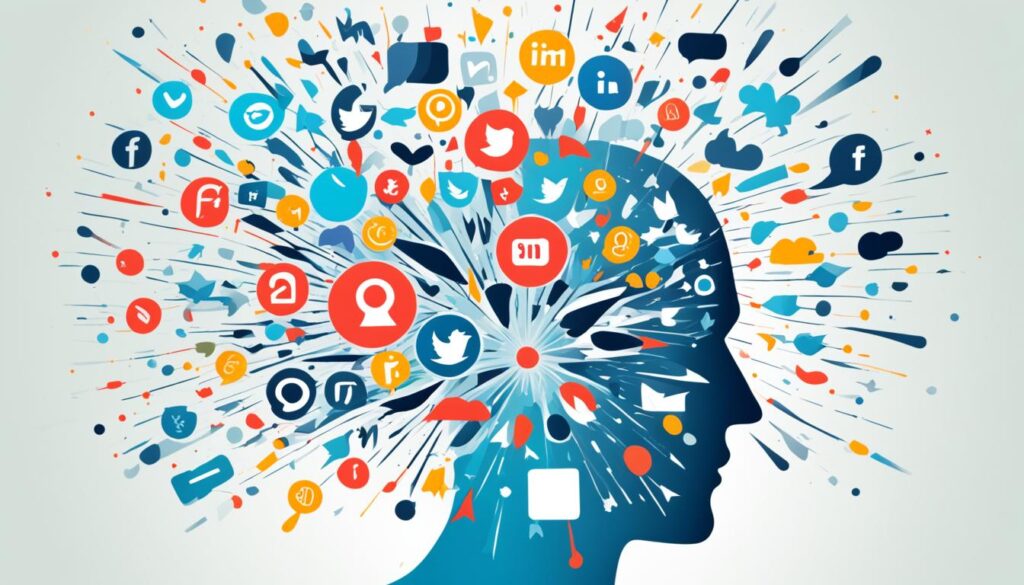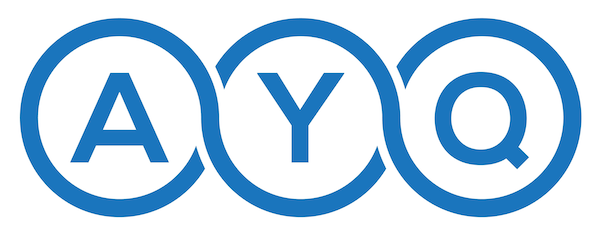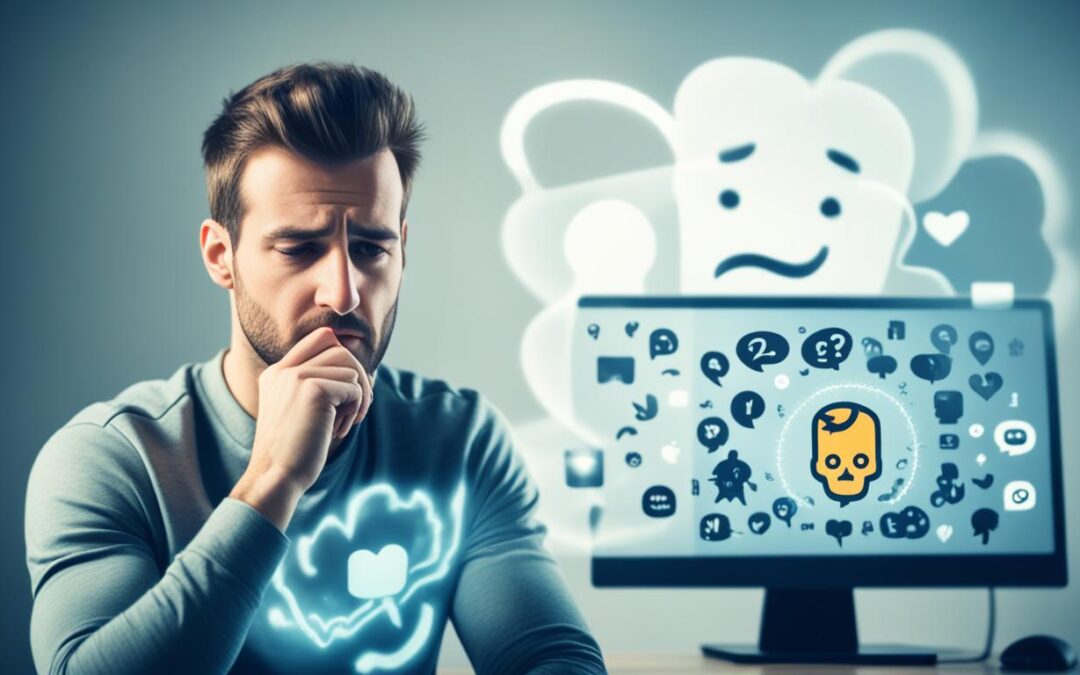Welcome to our article exploring the impact of social media use on your mental health. In today’s digitally connected world, social media platforms like Facebook, Twitter, Instagram, and Snapchat have become an integral part of our lives. While they offer many benefits, it’s important to understand how excessive use can potentially impact your mental well-being.
Research has shown that spending too much time on social media can lead to feelings of loneliness, depression, anxiety, and low self-esteem. The constant exposure to carefully curated and idealized images can contribute to negative body image issues and a sense of inadequacy. It’s crucial to be mindful of your social media use and find a healthy balance to protect your mental health.
In this article, we will delve deeper into the role social media plays in mental health, the negative effects it can have, the psychology behind our social media use, and how it impacts different age groups. We will also provide valuable tips for maintaining healthy social media habits. So, let’s get started and learn how to navigate the world of social media for better mental well-being.
The Role of Social Media in Mental Health
Human beings are social creatures by nature, and our connections with others play a vital role in our mental health and overall happiness. In today’s digital age, social media platforms have become an integral part of our daily lives, providing us with avenues to connect, communicate, and share our lives with others.
While social media offers many benefits, such as the ability to stay connected with friends and family across distances and finding new friends with shared interests, it’s important to recognize that virtual interactions on social media cannot fully replace the benefits of real-world human connections. Research has shown that excessive use of social media can have a negative impact on mental health, leading to feelings of loneliness, anxiety, depression, and even self-harm.
Studies have consistently found a strong correlation between heavy social media use and an increased risk of mental health issues. The curated nature of social media content often presents an idealized version of reality, leading individuals to compare themselves to others and experience feelings of inadequacy. Moreover, the constant exposure to images and updates from others’ lives can contribute to feelings of envy, further impacting mental well-being.
It is essential to prioritize in-person interactions and strike a healthy balance between virtual and real-world connections. Engaging in face-to-face conversations and nurturing relationships offline provides critical psychological benefits that cannot be replicated on social media platforms. Maintaining strong social connections has been linked to lower rates of depression, anxiety, and loneliness. Building and fostering meaningful relationships, both online and offline, is crucial for maintaining positive mental health.
The Psychological Effects of Social Media
Understanding the psychological effects of social media can shed light on the impact it has on our mental health. Social media platforms are designed to be addictive, employing strategies that keep users engaged for extended periods. The unpredictability of receiving notifications, likes, and comments triggers the release of dopamine in the brain, creating a desire for more engagement.
Additionally, social media can serve as an escape or a distraction from real-life situations that individuals may find challenging or uncomfortable. It can act as a “security blanket” for those who struggle with anxiety or have difficulty navigating social situations. However, relying solely on social media for emotional support may contribute to a sense of isolation and further exacerbate mental health issues.
| The Role of Social Media | Negative Effects on Mental Health |
|---|---|
| Connect with others globally | Feelings of loneliness and isolation |
| Find new friends with shared interests | Increased risk of depression and anxiety |
| Seek emotional support | Comparison and feelings of inadequacy |
It is crucial to develop healthy habits and boundaries when it comes to social media use. Setting aside specific times for social media engagement, limiting overall usage, and choosing to participate in activities that promote holistic well-being can help individuals maintain a healthier relationship with social media and protect their mental health.
The Negative Effects of Social Media on Mental Health
Excessive social media use can have detrimental effects on mental health. The constant exposure to filtered and idealized images on social media platforms can create feelings of inadequacy, envy, and dissatisfaction with one’s own life and appearance. Comparing ourselves to the carefully curated online personas of others can lead to a negative self-image and decreased self-esteem. This can contribute to mental health issues such as depression, anxiety, and even eating disorders.
Fear of missing out (FOMO) is another common phenomenon that can be amplified by social media. Seeing others’ seemingly exciting and perfect experiences can leave individuals feeling anxious and left out. This constant comparison and feeling of missing out on something better can increase stress levels and negatively impact mental well-being.
Cyberbullying is also a prevalent issue on social media platforms. The anonymity and distant nature of online interactions can embolden individuals to engage in harmful behavior. Cyberbullying can have severe emotional consequences for those who experience it, leading to increased levels of stress, depression, and even thoughts of self-harm.
Moreover, excessive use of social media can contribute to self-absorption and a decrease in real-life connections. Spending too much time on social media can lead to a disconnection from the present moment and a lack of meaningful face-to-face interactions. This can result in feelings of loneliness, isolation, and a decline in overall mental health.
To better understand the negative effects of social media on mental health, let’s take a look at a comparative table:
| Negative Effects | Social Media | Mental Health |
|---|---|---|
| Feelings of inadequacy | Constant exposure to filtered and idealized images | Decreased self-esteem and negative self-image |
| Anxiety and FOMO | Comparing oneself to others online | Increased stress levels and feelings of being left out |
| Cyberbullying | Anonymity and distance in online interactions | Emotional consequences, stress, and depression |
| Decreased real-life connections | Excessive use of social media platforms | Feelings of loneliness and isolation |
It’s crucial to be aware of these negative effects and make conscious choices about how we engage with social media. Developing healthy habits and setting boundaries can help protect our mental well-being. In the next section, we will explore the psychology behind social media use and how it influences our behavior and mental health.
Negative Effects of Social Media on Mental Health
The Psychology Behind Social Media Use
Social media platforms have revolutionized the way we connect and interact with others. From sharing photos and updates to engaging in discussions and exploring new interests, social media has become an integral part of our lives. But have you ever wondered why social media can be so addictive? What drives us to spend hours scrolling through feeds and refreshing notifications?
The psychology behind social media use offers valuable insights into our behaviors and motivations when it comes to these platforms. It involves understanding how social media platforms are designed to capture our attention, the impact of dopamine on our brain, and the role of impulse control in our social media habits.
The Reward System and Dopamine
One of the key factors that make social media addictive is the reward system in our brain. When we receive likes, comments, or other forms of positive feedback on our posts, it triggers a release of dopamine – the “feel-good” neurotransmitter. This release of dopamine creates a pleasurable sensation and reinforces the behavior, making us want more engagement and validation on social media.
Moreover, social media platforms often use unpredictable rewards to keep us engaged. We never know when we’ll receive that next like or comment, which creates a sense of anticipation and excitement. This unpredictable nature taps into our brain’s reward circuitry, driving us to continue seeking validation through social media interactions.
Impulse Control and Social Media
Impulse control plays a crucial role in our social media habits. When we see others posting updates about their lives or sharing exciting experiences, we can experience a fear of missing out (FOMO). This fear drives us to constantly check social media for updates and notifications, as we don’t want to miss out on any important information or social connections.
Impulse control also comes into play when we feel anxious or lonely in social situations. Social media can serve as a “security blanket” for many individuals, providing a sense of comfort and distraction from real-life interactions. However, relying too heavily on social media as a coping mechanism can hinder our ability to develop deep, meaningful connections and exacerbate feelings of loneliness in the long run.
Gaining Control Over Your Social Media Habits
Understanding the psychology behind social media use is the first step towards gaining control over your behavior and making healthier choices. Here are some tips to help you establish a more balanced approach to social media:
| Tips for Healthy Social Media Use |
|---|
| 1. Set specific time limits: Determine how much time you want to spend on social media each day and stick to it. Use apps or built-in device features that help you track and manage your usage. |
| 2. Create off-screen routines: Find activities that bring you joy and fulfillment outside of social media. Engage in hobbies, exercise, spend time with loved ones, or explore new interests to help reduce your reliance on social media for entertainment. |
| 3. Be mindful of your emotional state: Pay attention to how social media affects your mood and well-being. If you notice negative emotions or triggers, take a break or limit your exposure to certain types of content. |
| 4. Foster real-world connections: Prioritize face-to-face interactions and nurture meaningful relationships outside of social media. Engage in activities that allow you to connect with others on a deeper level and build stronger social connections. |
| 5. Practice self-reflection: Take time to reflect on your social media habits and the purpose behind your online interactions. Ensure that your social media use aligns with your values and promotes positive mental well-being. |
By understanding the psychological mechanisms at play and implementing these strategies, you can regain control over your social media habits and foster a healthier relationship with these platforms.

Impact of Social Media on Different Age Groups
Social media has a unique impact on individuals across different age groups. From teenagers and young adults who are still discovering their identities to middle-aged adults seeking connection, and older adults using social media to stay in touch, the effects on mental health vary.
The Impact on Teenagers and Young Adults
For teenagers and young adults, social media can have a significant influence on their self-esteem and mental health. As this age group is still developing their identities and seeking validation, constant exposure to idealized images and the pressure to conform to societal standards can lead to body image issues and feelings of inadequacy.
The expectation of portraying a perfect life on social media can create unrealistic standards and foster a sense of comparison. This constant comparison and fear of missing out (FOMO) can contribute to anxiety and a distorted sense of self-worth.
The Impact on Middle-Aged Adults
For middle-aged adults, social media serves as a platform for connection and seeking emotional support. It allows them to maintain relationships with family and friends, share experiences, and find communities that align with their interests and needs.
However, excessive social media use can still lead to negative mental health outcomes. The constant exposure to carefully curated lives of others can create feelings of inadequacy or a sense of missing out on experiences. It’s important for middle-aged adults to find a healthy balance in their social media habits to maintain positive mental well-being.
The Impact on Older Adults
Older adults often find social media platforms helpful for staying connected with family and friends, especially those who may be physically far away. It provides a means to share updates, memories, and engage in conversations.
However, for some older adults, the fast-paced and often superficial nature of social media can be overwhelming. They may feel left out or struggle to adapt to the rapidly changing technology. It’s important to consider the individual experiences and vulnerabilities of older adults when examining the impact of social media on their mental health.
Overall, the impact of social media on different age groups varies. While it can provide opportunities for connection and support, it also poses risks to mental well-being. It’s crucial for individuals of all age groups to be mindful of their social media use and prioritize their mental health and well-being.
Tips for Healthy Social Media Use
Social media has become an integral part of our daily lives, and while it can have negative effects on our mental health, there are ways to ensure a healthy and positive experience.
First and foremost, it’s important to set boundaries and establish a healthy balance in your social media use. Limit the amount of time you spend scrolling through feeds and interacting with posts. Instead, allocate more time for activities that promote your well-being, such as exercise, hobbies, or spending quality time with loved ones.
Secondly, curate your social media feed to create a positive and uplifting environment. Unfollow accounts that make you feel inadequate or trigger negative emotions. Instead, follow accounts that inspire you, promote mental health awareness, and share content that aligns with your interests and values.
Lastly, engage with social media mindfully. Take breaks regularly and practice self-reflection. Notice how social media makes you feel and identify any negative emotions or triggers. If you find yourself comparing your life to others or feeling overwhelmed, it may be time to take a step back and reassess your social media habits.
Remember, healthy social media use is all about prioritizing your mental health and well-being. By setting boundaries, curating your feed, and engaging mindfully, you can enjoy the benefits of social media while protecting your mental well-being.

